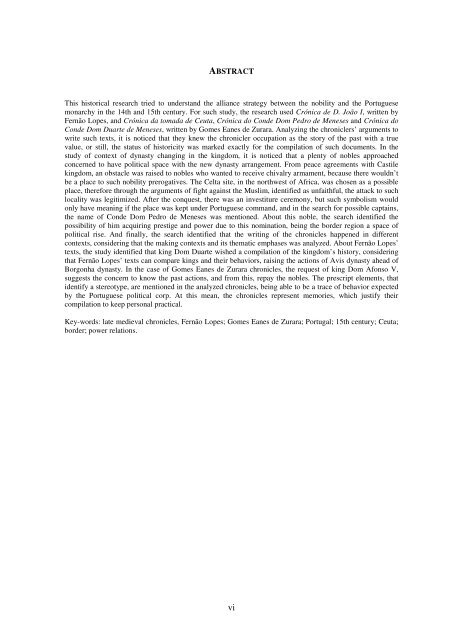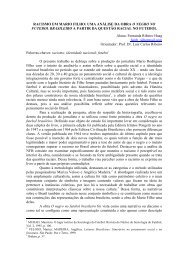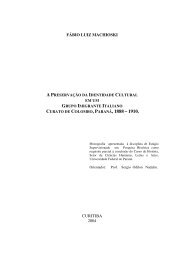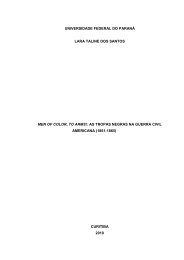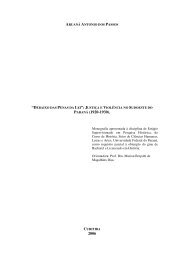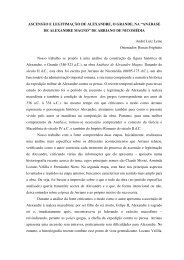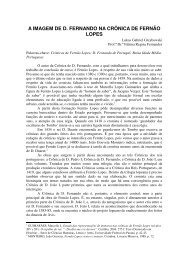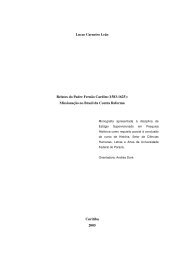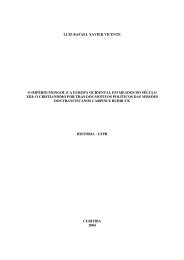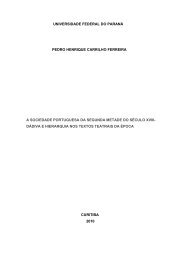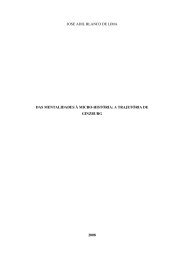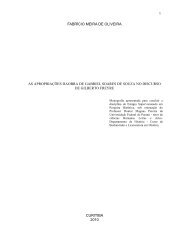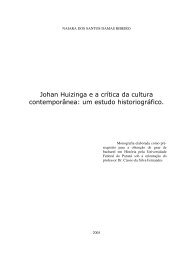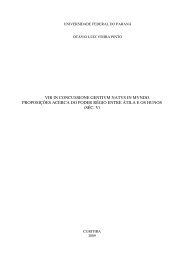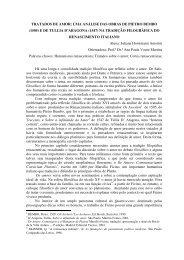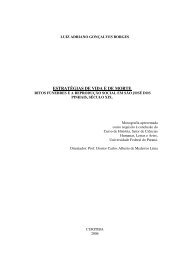(C. 1385-1464) 2007 - Departamento de História - Universidade ...
(C. 1385-1464) 2007 - Departamento de História - Universidade ...
(C. 1385-1464) 2007 - Departamento de História - Universidade ...
Create successful ePaper yourself
Turn your PDF publications into a flip-book with our unique Google optimized e-Paper software.
ABSTRACT<br />
This historical research tried to un<strong>de</strong>rstand the alliance strategy between the nobility and the Portuguese<br />
monarchy in the 14th and 15th century. For such study, the research used Crónica <strong>de</strong> D. João I, written by<br />
Fernão Lopes, and Crónica da tomada <strong>de</strong> Ceuta, Crónica do Con<strong>de</strong> Dom Pedro <strong>de</strong> Meneses and Crónica do<br />
Con<strong>de</strong> Dom Duarte <strong>de</strong> Meneses, written by Gomes Eanes <strong>de</strong> Zurara. Analyzing the chroniclers’ arguments to<br />
write such texts, it is noticed that they knew the chronicler occupation as the story of the past with a true<br />
value, or still, the status of historicity was marked exactly for the compilation of such documents. In the<br />
study of context of dynasty changing in the kingdom, it is noticed that a plenty of nobles approached<br />
concerned to have political space with the new dynasty arrangement. From peace agreements with Castile<br />
kingdom, an obstacle was raised to nobles who wanted to receive chivalry armament, because there wouldn’t<br />
be a place to such nobility prerogatives. The Celta site, in the northwest of Africa, was chosen as a possible<br />
place, therefore through the arguments of fight against the Muslim, i<strong>de</strong>ntified as unfaithful, the attack to such<br />
locality was legitimized. After the conquest, there was an investiture ceremony, but such symbolism would<br />
only have meaning if the place was kept un<strong>de</strong>r Portuguese command, and in the search for possible captains,<br />
the name of Con<strong>de</strong> Dom Pedro <strong>de</strong> Meneses was mentioned. About this noble, the search i<strong>de</strong>ntified the<br />
possibility of him acquiring prestige and power due to this nomination, being the bor<strong>de</strong>r region a space of<br />
political rise. And finally, the search i<strong>de</strong>ntified that the writing of the chronicles happened in different<br />
contexts, consi<strong>de</strong>ring that the making contexts and its thematic emphases was analyzed. About Fernão Lopes’<br />
texts, the study i<strong>de</strong>ntified that king Dom Duarte wished a compilation of the kingdom’s history, consi<strong>de</strong>ring<br />
that Fernão Lopes’ texts can compare kings and their behaviors, raising the actions of Avis dynasty ahead of<br />
Borgonha dynasty. In the case of Gomes Eanes <strong>de</strong> Zurara chronicles, the request of king Dom Afonso V,<br />
suggests the concern to know the past actions, and from this, repay the nobles. The prescript elements, that<br />
i<strong>de</strong>ntify a stereotype, are mentioned in the analyzed chronicles, being able to be a trace of behavior expected<br />
by the Portuguese political corp. At this mean, the chronicles represent memories, which justify their<br />
compilation to keep personal practical.<br />
Key-words: late medieval chronicles, Fernão Lopes; Gomes Eanes <strong>de</strong> Zurara; Portugal; 15th century; Ceuta;<br />
bor<strong>de</strong>r; power relations.<br />
vi


